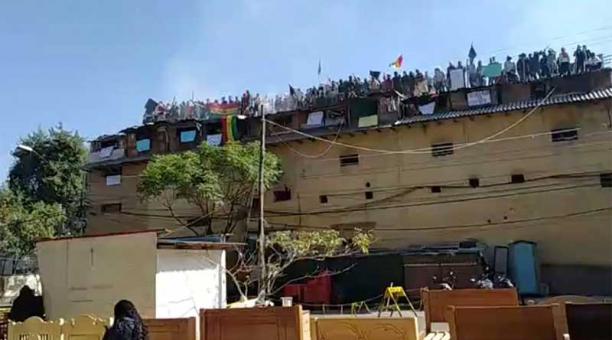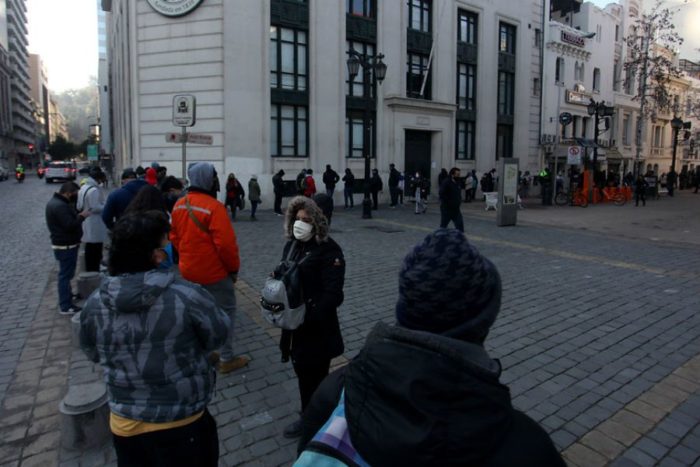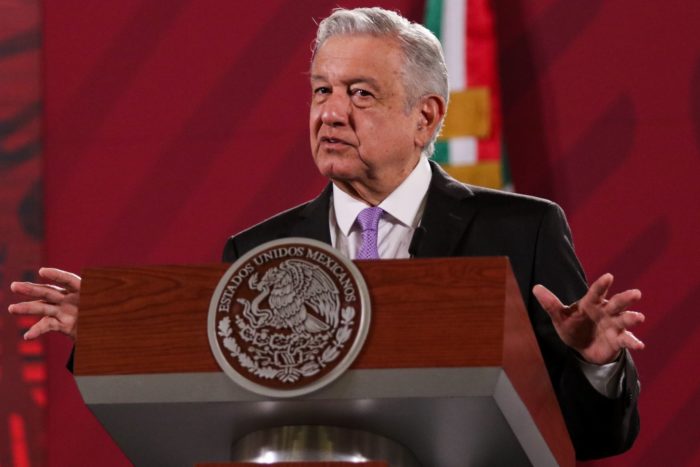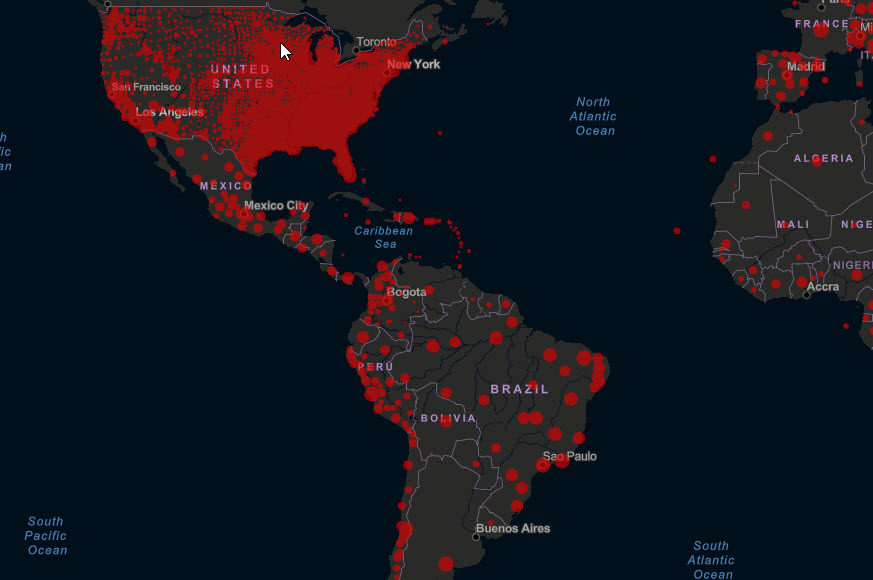- By Emily Gregg, edited by Mike Gatehouse.
- LAB has put together this twelfth overview of the spread of coronavirus across the region and the reaction of governments, politicians and local communities. With our limited resources we could not hope to provide a truly comprehensive survey.
- Figures for infections and mortality, summarised in the table at the end, are those given by the World Health Organisation Situation Report 199 on Thursday 6 August, and John Hopkins University Coronavirus Centre, as of 4pm (GMT), 6 August. Where figures appear in the images within the article, they may refer to earlier dates. We are unable to provide figures on excess deaths due to the lack of data for most countries in the region.
- LAB will attempt to follow up this story, focusing on the poor, marginal communities, indigenous groups and inequalities in treatment and economic compensation for the effects of this terrible pandemic on individuals and families.
- See LAB articles at the head of our Home Page and in the Covid-19 section for further news, testimony & information. See also the posts on our Facebook page.
Bolivia
Protests in Latin America’s prisons due to fears of contagion in unsanitary conditions spread to Bolivia. Coordinated riots broke out on 27 July in four of the most crowded prisons in the Cochabamba department. They came after the death of an eighth prisoner in the department from suspected Covid-19. The inmates demanded medicine and medical attention as fears of the virus sweeping throughf the entire prison population grew evermore intense.

Over 60 people have died in prisons in San Pedro, La Paz, Palmasola, and Santa Cruz. A lack of tests means that the causes of their deaths cannot be confirmed.
Further protests were seen in El Alto, near La Paz, on 28 July, as thousands demanded the rescheduled elections be held on 6 September. The demonstrations were some of the largest seen so far, protesting the further delays to elections that were initially due to be held on 3 May. The Supreme Electoral Tribunal, however, had decided to further postpone elections until 18 October, as the peak of the virus is expected in the next two months.
The protests are fuelling political tensions between the interim government and MAS, the party of ousted president Evo Morales. The government had expressed concern that the opposition-organised protests could lead to an ‘explosion’ of new cases of coronavirus . The Minister of the Presidency, Yerko Núñez, has also accused trade union leaders and the MAS president of crimes against public health for their role in organising protests.
If you find this article useful, please consider donating to LAB. At present LAB is run entirely by volunteers. If we had more resources, we could do so much more. You can donatehere– we are a registered charity. If you can make a regular or monthly donation, that will help us to plan and extend our work.
On the other hand, Juan Carlos Huarachi, the leader of the Bolivian Workers’ Centre COB, the chief trade union federation, said ‘The problem in [Bolivia] isn’t coronavirus, the problem is this incompetent government’. The federation has accused interim president Jeanine Añez of using the pandemic to hold onto power and to harass political opponents. An indefinite general strike and protests have been called across nine of the country’s departments.
Bolivia’s school year was brought to a close at the end of July to limit the rising number of cases of coronavirus. School classes – both virtual and in the classroom – have been cancelled. The government say the measure is to protect “the life, health, and integrity of students, teachers, and parents”. Nuñez justified the cancellation of online classes by noting the lack of access to the internet in rural areas.
Students will advance to the next school grade and teachers will receive pay for the rest of the school year. The ministry for education has pledged to continue to strengthen digital training for teachers and that distance learning will be broadcast on radio and television channels.
You will find many more articles on the Covid-19 crisis on our website. Go to our Home Page to see the latest, or for a full list, go to the News page. You can also keep up-to-date by subscribing to our (free) monthly e-mail newsletter.
Brazil
Brazil’s president Jair Bolsonaro has tested negative for Coronavirus, almost three weeks after he initially tested positive. He published a photo on social media next to a box of hydroxychloroquine. Bolsonaro and US president Donald Trump have both pushed the antimalarial drug as a cure for Covid, despite the scientific community’s warnings about its safety and the lack of any evidence for its efficacy against coronavirus.
Bolsonaro did not give details of his test nor the date he took it. Michelle Bolsonaro, Brazil’s first lady, and Marcos Pontes, Brazil’s science and technology minister, both tested positive for Coronavirus on 30 July.
The president is, however, reported to be suffering from a lung infection. His medical team claim it is unrelated to the coronavirus infection. Mr Bolsonaro completed a scheduled visit to Bahía, Piauí, and Rio Grande do Sul in the south of the country the day after confirming that he was taking antibiotics for the infection.
Aritana Yawalapiti, an influential indigenous leader, was hospitalised on 22 July with coronavirus. After initially refusing to leave his community in a remote area of Mato Grosso, he embarked on an eight-hour car journey to São Francisco hospital in Goiânia as his condition deteriorated. He remained in ICU for two weeks, until he sadly passed away on 5 August. He had been a key human rights and environmental defender, and he had helped establish the Xingu Indigenous Park, the first of its kind in the world.
Chile
Three million Chileans started the process to withdraw funds from their pensions last Thursday (30 July). The controversial measure had polarised government, with thirteen members of the ruling coalition voting alongside the opposition in favour of the bill. Long queues were seen outside banks as subscribers to the privatised Pension Fund Administrators (AFP) sought to access their retirement savings after the pandemic left many in financial difficulties. Some of the AFP webpages crashed as members tried to access their funds, and there were calls on social media for the less needy to refrain from starting the process to ensure that the more desperate can gain access.
The funds will be available ten days after the request is made. Members of the AFP scheme can access five per cent of their pension anytime within the next year, and then access the same amount in one month’s time.

Colombia
A bill is to be discussed in Colombia which seeks to allow AFP affiliates to withdraw ten per cent of their pensions. In comparison to the Chilean law which allows any and all members to withdraw funds, the Colombian version would only be available to ‘inactive’ members – generally those unemployed or freelancers. Almost five million Colombians are believed to have lost their job in May alone.
Four intensive care doctors have walked out of a clinic in Córdoba, Montería, after working there without payment for over a year. The Colombian Association of Critical Medicine and Intensive Care, and the Colombian Association of Scientific Communities sent a letter outlining their grave concern, to Fernando Ruiz, the minister for health.
The letter warned that the pandemic and 85 per cent ICU occupancy rates makes their resignation “worrying and of high priority”. They have requested measures to guarantee medical workers’ pay and an investigation into why the doctors were not paid.
Mexico
Hotels in Mexico are to be converted into temporary refuges for victims of domestic violence. Feminist and child protection organisations have repeatedly highlighted the dangers lockdowns and quarantines pose to victims of domestic abuse. Nonetheless, Mexico’s government cut funding to women’s refuges by 75 per cent just last month.
The new plans are part of the UN’s ‘spotlight’ program. The program will start in Mexico in September.
The health secretary of the state of Chihuahua, Jesús Grajeda, died from coronavirus on 26 July. He had been taken to hospital a couple of weeks before his death and had shown some signs of improvement before suffering cardiac failure.
President Lopez Obrador, known as AMLO, has said he will not wear a mask until ‘there is no corruption’ in Mexico. One of the president’s main electoral pledges was to tackle corruption in the country. However, given the extent of corruption in Mexico, AMLO’s comment seems a pledge that he will never wear a mask voluntarily. He has been a mask-sceptic throughout the pandemic and has only publicly worn one once while on a commercial flight.

Paraguay
Quarantine restrictions were increased in the Alto Paraná region of Paraguay on 29 July. The region has half of the country’s cases of coronavirus, and the measure was set to return the region to stage zero and strict quarantine for two weeks.
However, the restrictions were eased after a night of protests, which led to sixty people being arrested. Shops will now be allowed to open during the day. Restaurants and gyms will remain closed.
Peru
The Peruvian government issued a supreme decree on 31 July which renewed state of emergency restrictions in throughout the five regions of Arequipa, Ica, Junín, Huánuco, and San Martín, and in certain provinces of another ten, including Cuzco, Amazonas, and Madre de Dios. In some areas, the rate of infection R is believed to be around 2, and more hospital facilities are overwhelmed.
President Vizcarra announced a range of measures in his Independence Day speech, which the Peru Support Group has criticised as ‘palliative’ rather than substantive long-term solutions. The measures include a second payment of the equivalent of US$215. The first payment, issued in May, encountered a variety of problems as those without access to the banking system were excluded and the further spread of infection was linked to people visiting the banks to collect the cash.
Other measures include a monthly payment of US$56 to orphans of the pandemic, and an increase in government health spending by US$420 million.
Venezuela
A Norwegian delegation has travelled to Venezuela to inspect the political and humanitarian situation in the country, without specific mention of coronavirus. Norway had mediated discussions between Maduro and the opposition last year, although no substantial progress was made.
A Reuters resport from Caracas suggests that the capital’s main produce market, Coche, is at the centre of a wave of new infections, despite government efforts to limit the opening hours of wholesale markets. Meanwhile, 29 Cuban healthworkers, returning home from work in Venezuela, have tested positive in the last eight days.
Country by country summary. Case and death figures from WHO Situation Report 199, Thursday 6 August 2020, and John Hopkins University Coronavirus Centre as of 4pm (GMT), 6 August 2020.
Reports from some individual governments and unofficial sources suggest considerably higher figures.
| Country | WHO Situation Report 185 | John Hopkins University | ||
|---|---|---|---|---|
| Cases | Deaths | Cases | Deaths | |
| Argentina | 213,535 | 4,009 | 220,682 | 4,135 |
| Belize | 67 | 2 | 86 | 2 |
| Bolivia | 83,361 | 3,320 | 85,141 | 3,385 |
| Brazil | 2,801,921 | 95,819 | 2,859,073 | 97,256 |
| Chile | 364,723 | 9,792 | 364,723 | 9,792 |
| Colombia | 334,979 | 11,315 | 345,714 | 11,373 |
| Costa Rica | 19,837 | 181 | 20,417 | 191 |
| Cuba | 2,726 | 88 | 2,726 | 88 |
| Dominican Republic | 75,660 | 1,222 | 75,660 | 1,222 |
| Ecuador | 88,866 | 5,847 | 88,866 | 5,847 |
| El Salvador | 18,701 | 498 | 18,701 | 513 |
| Guatemala | 53,509 | 2,072 | 53,509 | 2,072 |
| Haiti | 7,532 | 171 | 7,544 | 171 |
| Honduras | 44,299 | 1,400 | 45,098 | 1,423 |
| Mexico | 449,961 | 48,869 | 456,100 | 49,698 |
| Nicaragua | 3,266 | 123 | 3,902 | 123 |
| Panama | 69,424 | 1,522 | 70,231 | 1,553 |
| Paraguay | 5,852 | 59 | 6,060 | 61 |
| Peru | 439,890 | 20,007 | 447,624 | 20,228 |
| Puerto Rico | 19,651 | 246 | data unavailable | data unavailable |
| Venezuela | 21,438 | 187 | 22,299 | 195 |
Emily Gregg is a LAB correspondent and author. She lived in Arica, Chile, until returning to the UK because of the pandemic. She also wrote The Student Revolution chapter in LAB’s book Voices of Latin America (2019).

